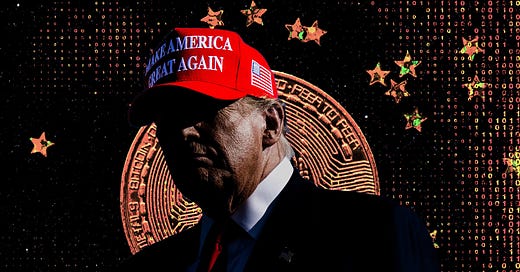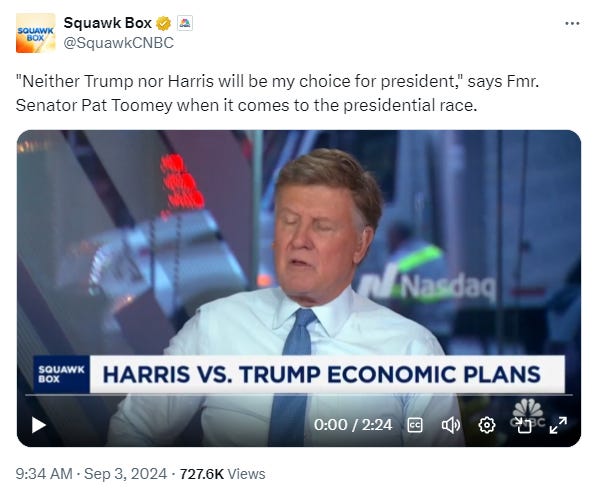
Is Your MAGA Crypto Scam Authorized?
The only difference between Trump’s ‘official’ crypto rackets and the scams that imitate them is who gets the profits.
The NFL season starts tomorrow, which means it’s time to brace for peak Awful Ads Season: a one-two punch of closing-stretch political ads and ads for sports gambling sites. Everyone stay safe out there. Happy Wednesday.
What’s ‘Real’ Online?
—Andrew Egger
Here’s a worrying trend on the MAGA internet in recent weeks: The scams are coming thicker and faster, and they’re getting harder to distinguish from reality.
Last night, Lara and Tiffany Trump seemingly shared a big announcement: The official Trump-sanctioned crypto project was live! Their posts pledged to “take power away from the centralized banks” and to allow “the average person to thrive on taking charge of their own finances.” The average person’s ticket to such flourishing: the new “World Liberty” cryptocurrency, trading on the platform Solana as $WL.
But no, Lara’s husband Eric Trump scurried to write: These posts were fakes! Lara and Tiffany had been hacked!
As it turned out, $WL was an impostor—a Trump-branded crypto token someone had minted without the Trumps’ consent. The whole thing was over in about an hour, but hundreds of thousands of dollars had already changed hands.
Sometimes the scams are more intricate than this. When glitches delayed Elon Musk’s X-Spaces interview with Donald Trump a few weeks ago, hundreds of thousands of impatient would-be-listeners found themselves following links to YouTube streams purporting to mirror the conversation. There, many were met with faked video of an AI-generated Elon Musk hawking a different crypto swindle, one of the “send crypto to this address and we’ll double your money” variety.
It’s no wonder rackets like these proliferate. Sifting truth and lies is an incredibly difficult task online these days, and that’s especially true on the astroturf get-rich-quick playground of crypto. And MAGA foot soldiers, known more for their devotion to the cause than their deductive reasoning abilities, make for excellent marks.
But there’s another reason these rackets work, too: Donald Trump is running crypto grifts of his own all the time.
I don’t just mean those ludicrous $99 trading cards. The $WL token may have been a scam, but “World Liberty” isn’t—it’s a real new crypto venture Trump and his sons have been teasing for weeks.
But what makes a crypto venture “real,” exactly? As crypto news site CoinDesk reported yesterday, “World Liberty” appears to be a newly Trumpified iteration of an extant blockchain app, Dough Finance:
The former U.S. president’s inner circle has been quietly shopping around a white paper for World Liberty Financial . . . The document and other reporting describe a borrowing and lending service strikingly similar to Dough Finance, a recently hacked blockchain app built by four people listed as World Liberty Financial team members. Other participants include all three of Trump’s sons (including 18-year-old Barron, who is identified as the project's “DeFi visionary”), financiers and e-commerce influencers.
Yesterday’s scam was straightforwardly a scam. But was it a worse scam than slapping a MAGA coat of paint on a sputtering crypto app to bring in a more credulous clientele? Was the Trump family’s primary concern with Lara and Tiffany’s accounts being hacked that it funneled the profits to persons unknown, rather than to the family?
Also, what kind of operation is “World Liberty Financial,” anyway? You’ll be glad to hear the brightest entrepreneurial minds of the crypto sphere are involved. Here’s CoinBase again:
Zachary Folkman and Chase Herro [are] listed in the white paper as World Liberty Financial’s head of operations and its data and strategies lead, respectively . . .
A limited liability corporation for World Liberty Financial is registered to Folkman, who, along with Herro, is the co-creator of Subify, which bills itself as a censorship-free competitor to both Patreon and OnlyFans—both services that let customers pay content creators, with the latter skewing toward explicit content. Folkman previously registered a company called Date Hotter Girls LLC and posted seminars on YouTube on how to pick up women.
Until pretty recently, Donald Trump’s posture toward the wooly world of cryptocurrency was mostly simple old-head skepticism. “Bitcoin, it just seems like a scam,” Trump told Fox Business back in 2021. “I don’t like it because it’s another currency competing against the dollar.”
It wasn’t long, of course, before Trump realized Bitcoin and the dollar didn’t have to be enemies: In fact, he could make a nice little pile of the latter by publicly embracing the former.
“You know, they call me the crypto president,” Trump said in a video last month. “I don’t know if that’s true or not, but many people are saying that.”
Speaking of dollars, just 10 of ‘em per month gets you unlimited access to everything The Bulwark has to offer. Join us today!
Slog We Must
—William Kristol
Just a brief note this morning, as I’m still recovering from my excursus into Donald Trump’s mind yesterday. You do want to try to think about the way he’s thinking, so as to help combat him more effectively. But it’s not really pleasant, even temporarily and fictionally, to venture into that dark mental space.
And then you finish your little effort and you go online and read about Tucker Carlson and Nazi apologists, and you come across the usual varieties of MAGA bigotry and misogyny, and you just wish—God, can’t we just put this all far behind us?
Nope. We can’t. Not yet, certainly.
What strikes me is that things feel more challenging psychologically—if I can put it that way—now than they did in the last two presidential elections.
At this time in 2016, many of us were deeply demoralized that Trump was the Republican nominee. But we were committed to his defeat in the general election, and we mostly assumed Trump was going to lose. I was actually a bit more worried than many of my associates. I remember saying to a Clinton campaign operative in September that I thought Trump had maybe a one in four chance of winning. He scoffed. And I thought, ‘Ok, they have access to the best data, and they’re not worried, so maybe I shouldn’t be.’
Still, what I remember about 2016 is less any great nervousness before Election Day than the terrible feeling that evening, as the votes came, realizing that Florida and North Carolina were gone, and then that the Blue Wall of Pennsylvania, Michigan, and Wisconsin was crumbling. It was a horrible night, made more so by the excessive complacency of the months beforehand.
In 2020, we were alert to the dangers of complacency. But Biden seemed safely ahead throughout. Trump was mishandling the pandemic, and everyone was pretty confident going into Election Day. I remember watching Florida and North Carolina go down and thinking, Oh my God, not again. But, fortunately, it wasn’t to be again.
All of this is a way of saying that for me, at least, this election year has been more nerve-wracking than recent ones. I think that’s true of others, too.
Earlier this year, after all, when Biden was to be the Democratic nominee, Trump was ahead. This man, who since we last voted had instigated and was still justifying an insurrection, looked more likely than not to be our next president.
But Biden did (finally) step aside, and Kamala Harris took over. She had a very good first few weeks and a successful convention, and likely defeat turned into what seemed to be likely victory.
But that momentum couldn’t continue forever, Trumpism, we’re once again reminded, has more staying power than one would wish. And so here we are, two months out, with basically a toss-up election.
So every little thing can matter. And little things in campaigns have a tendency to bounce every which way, for good and for ill—which means one’s mood bounces up and down several times a week. Sometimes several times a day.
It can be exhausting. It can be harrowing. It can be exasperating. It can be enervating. It can be hard in such circumstances to keep one’s focus, to sustain one’s morale, and to keep calm and carry on. It’s a slog.
But what’s the choice? Ignominious defeat? No way. There are no weird tricks that will magically save us. So slog we must, and slog we will, onward, one trusts, to victory.
Quick Hits
On the site today, Will Selber chews over J.D. Vance’s recently resurfaced comments sneering about the United States allowing special visas for Afghans who had helped our troops in war: “Apparently Afghanistan is a country of translators and interpreters, because every single person that’s coming in, that’s what they say this person is.”
The whole thing is worth reading, but this line stood out: “Vance may not think Afghan interpreters deserve to be trusted, but [my interpreter] Ritchie proved himself. The question is why either of them thinks America should be trusted.”
BEYOND THE PALE: To comprehend the mind of the business-brained phenotype of GOP voter, you’ve got to hear this clip from yesterday of CNBC’s Joe Kernen losing his mind at former GOP Sen. Pat Toomey for saying he plans to vote for neither Donald Trump nor Kamala Harris at the top of the ticket. Yeah, yeah, January 6th, whatever—but come on, she wants a 28 percent corporate tax rate!
HEY, TRY SMILING MORE: Donald Trump showed up on the Lex Fridman Podcast yesterday, where the host tried in vain to serve as the former president’s shoulder angel: “In my personal opinion, I think you are at your best when you’re talking about a positive vision of the future rather than criticizing the other side.” Trump responded: “Yeah, I think you have to criticize, though. I think they’re nasty.” Folks, stop trying to get him to say he will be nicer or calmer. He doesn’t want to be. And even if he said he’d try to be, it wouldn’t be true.




















Imagine a world in which the winner of the popular vote for President actually BECAME President. None of this swing state bullshit, every vote equal in value to every other vote. No chewing your nails down to the quick because some small bunch of racist or sexist assholes that live in just the right place won't vote for a woman or black person over a senile white criminal.
But the only way you ever get that is over the cold dead body of the GoP, because the EC is the only thing keeping them in the Presidential game.
It needs to end.
Some thoughts in brief:
1) Color me unsurprised that DJT supporters lost money on a scam in the initial moments that it was there. I've never seen people so eager to be taken advantage of -- Lord help them if they treat their household finances the same way. I'm reminded of the expression about suckers being born every minute. And about a fool and his/her money. Give me hard, cold cash in the hand anytime over highly speculative ventures over which I have no personal control. As long as a scammer goes where the money flows, DJT supporters with overinflated passions always will be an audience of willing victims.
2) I understand Bill's skepticism at this point. Likely we all feel it. In national tallies the DJT vote count too often appears to exceed expectations. But perhaps it is the other way around. As a rule of thumb Republicans show up while disengaged Democrats too often take a pass on it. If even a modest fraction of them would do their civic duty that one day every four years, it's hard to see how the GOP ever would win a presidential contest, even with the Electoral College bias favoring the right.
3) I have little difficulty comprehending the mind of the business-brained phenotype of GOP voters, because it is how they approach so many things in life -- a transactional relationship. Most matters are measured in dollars and cents more than in their inherent worth -- profit versus loss, personal gain as opposed to everyone doing well, and so on. They must be fun at Christmas parties and gift exchanges. I'd like to ask them why they ever have children, since that is a really good way to part with a lot of money over a long period of time. Maybe some other things too are worth more than a booming bank account?
4) I've never had trouble understanding World War II. It was fundamentally a struggle between good and evil, between forces that would preserve freedom and democracy and those that would take it away, between goverments that were by, of, and for the people and dictatorships that were about a leader who was above the laws or would rewrite the laws and initiate policies that would victimize and exclude others in favor of a handful of favored people and an old order that had to be propped up by artificial means. Sound familiar?